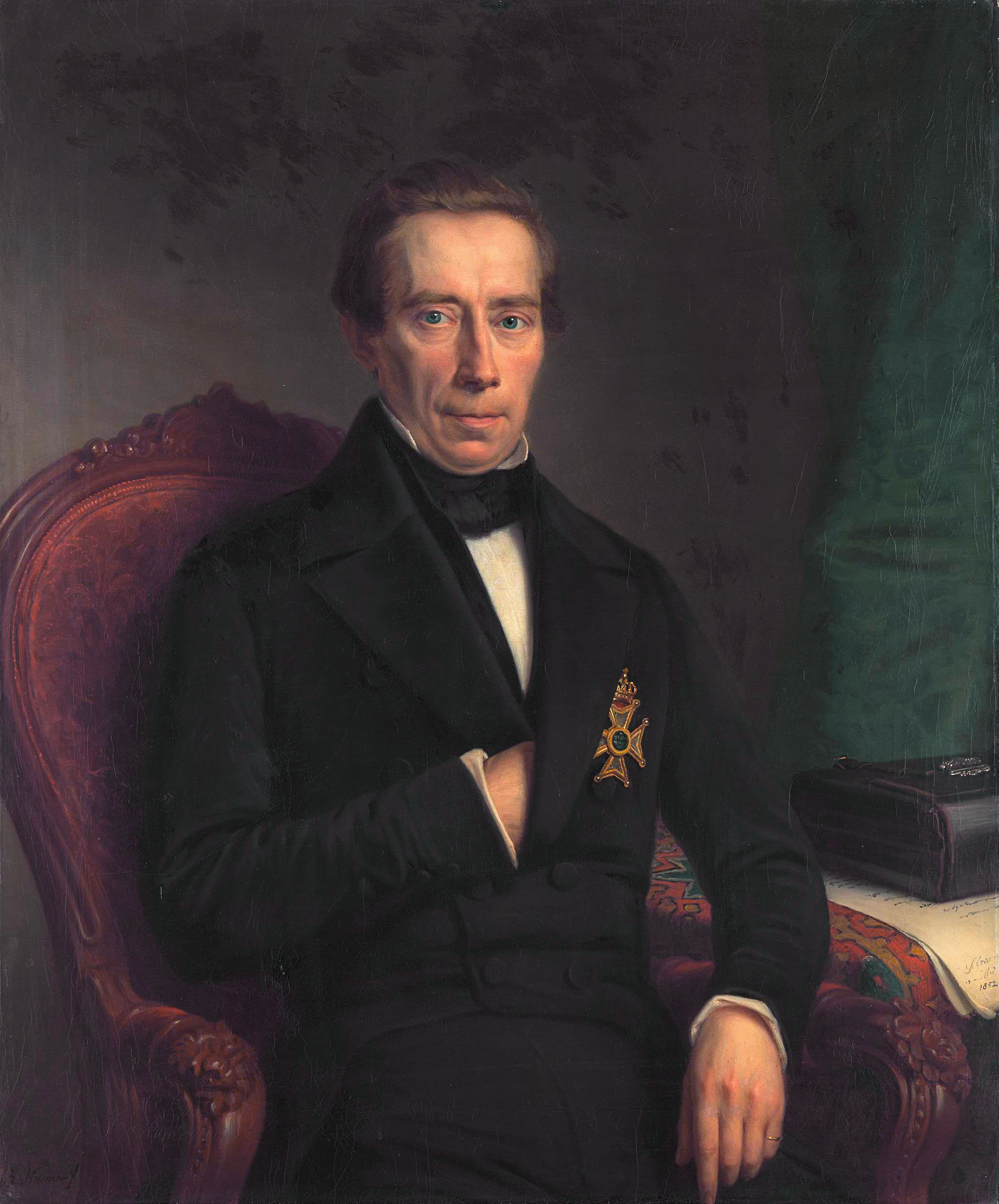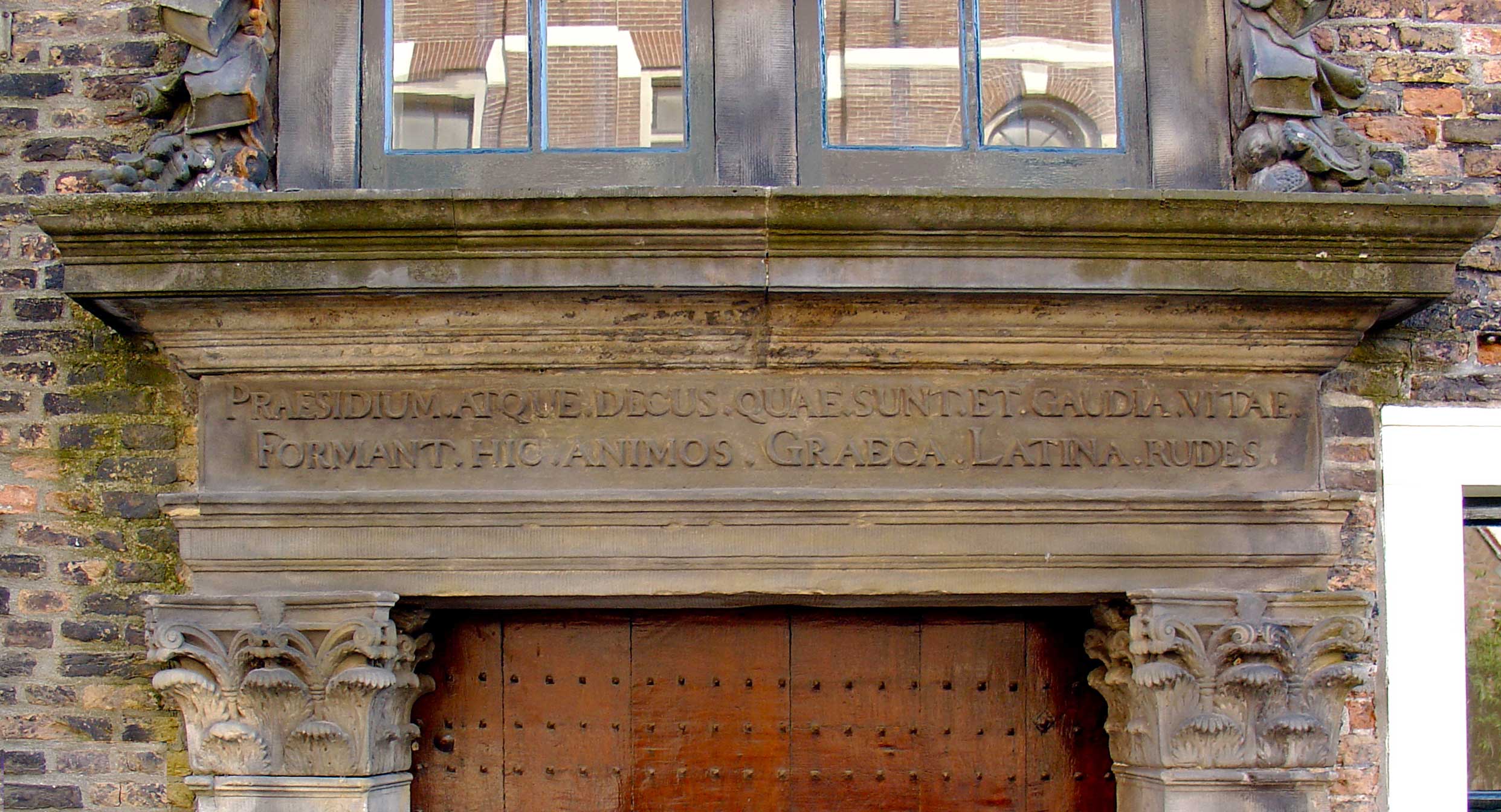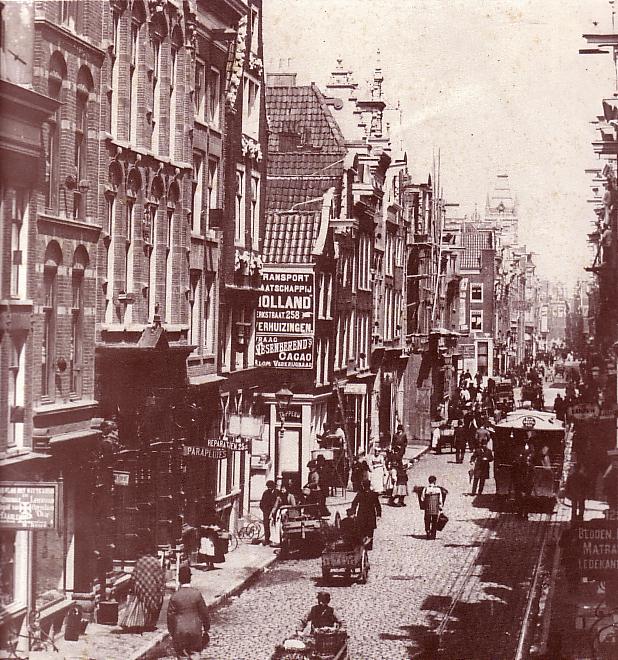|
Johan Rudolf Thorbecke
Johan Rudolph Thorbecke (14 January 1798 – 4 June 1872) was a Dutch liberal statesman, one of the most important Dutch politicians of the 19th century. Thorbecke is best known for heading the commission that drafted the revision of the Constitution of the Netherlands in 1848, amidst the liberal democratic revolutions of 1848. The new constitution transformed the country from an absolute monarchy into a constitutional monarchy, with the States General and the Council of Ministers becoming more powerful than the king. The amended constitution also granted individual rights to residents and citizens of the kingdom. This made the constitution one of the more progressive at the time. Thorbecke is generally considered a founding father of the modern political system of the Netherlands. Early life and education Thorbecke was born in Zwolle. His father Frederik Willem was a Lutheran tobacco manufacturer of German descent, while his mother Christine Regina was born in the Lower Saxo ... [...More Info...] [...Related Items...] OR: [Wikipedia] [Google] [Baidu] |
His Excellency
Excellency is an honorific style (manner of address), style given to certain high-level officers of a sovereign state, officials of an international organization, or members of an aristocracy. Once entitled to the title "Excellency", the holder usually retains the right to that courtesy throughout their lifetime, although in some cases the title is attached to a particular office and is held only during tenure of that office. Generally people addressed as ''Excellency'' are heads of state, heads of government, governors, ambassadors, Roman Catholic bishops, high-ranking ecclesiastics, and others holding equivalent rank, such as heads of international organizations. Members of royal families generally have distinct addresses such as Majesty, Highness, etc.. While not a title of office itself, the honorific ''Excellency'' precedes various titles held by the holder, both in speech and in writing. In reference to such an official, it takes the form ''His'' or ''Her Excellency''; in ... [...More Info...] [...Related Items...] OR: [Wikipedia] [Google] [Baidu] |
Liberalism In The Netherlands
Liberalism in the Netherlands started as an anti-monarchical effort spearheaded by the Dutch statesman Thorbecke, who almost single-handedly wrote the 1848 Constitution of the Netherlands that turned the country into a constitutional monarchy. In contemporary politics, there are both left and right-wing parties that refer to themselves as " liberal", with the former more often espousing social liberalism and the latter more often espousing conservative liberalism. A common characteristic of these parties that they are nominally secular, in contrast to the traditionally dominant and still popular Christian democracy. This article gives an overview of liberalism in the Netherlands. It is limited to political parties with substantial support, mainly proved by having had a representation in parliament. Background The Netherlands has a long liberal political tradition. From the founding of the Dutch Republic in the 16th century to beginning of the 19th century the main political conf ... [...More Info...] [...Related Items...] OR: [Wikipedia] [Google] [Baidu] |
Leiden
Leiden ( ; ; in English language, English and Archaism, archaic Dutch language, Dutch also Leyden) is a List of cities in the Netherlands by province, city and List of municipalities of the Netherlands, municipality in the Provinces of the Netherlands, province of South Holland, Netherlands. The municipality of Leiden has a population of 127,046 (31 January 2023), but the city forms one densely connected agglomeration with its suburbs Oegstgeest, Leiderdorp, Voorschoten and Zoeterwoude with 215,602 inhabitants. The Statistics Netherlands, Netherlands Central Bureau of Statistics (CBS) further includes Katwijk in the agglomeration which makes the total population of the Leiden urban agglomeration 282,207 and in the larger Leiden urban area also Teylingen, Noordwijk, and Noordwijkerhout are included with in total 365,913 inhabitants. Leiden is located on the Oude Rijn (Utrecht and South Holland), Oude Rijn, at a distance of some from The Hague to its south and some from Amsterdam ... [...More Info...] [...Related Items...] OR: [Wikipedia] [Google] [Baidu] |
Philosophy
Philosophy ('love of wisdom' in Ancient Greek) is a systematic study of general and fundamental questions concerning topics like existence, reason, knowledge, Value (ethics and social sciences), value, mind, and language. It is a rational and critical inquiry that reflects on its methods and assumptions. Historically, many of the individual sciences, such as physics and psychology, formed part of philosophy. However, they are considered separate academic disciplines in the modern sense of the term. Influential traditions in the history of philosophy include Western philosophy, Western, Islamic philosophy, Arabic–Persian, Indian philosophy, Indian, and Chinese philosophy. Western philosophy originated in Ancient Greece and covers a wide area of philosophical subfields. A central topic in Arabic–Persian philosophy is the relation between reason and revelation. Indian philosophy combines the Spirituality, spiritual problem of how to reach Enlightenment in Buddhism, enlighten ... [...More Info...] [...Related Items...] OR: [Wikipedia] [Google] [Baidu] |
Classical Literature
Classics, also classical studies or Ancient Greek and Roman studies, is the study of classical antiquity. In the Western world, ''classics'' traditionally refers to the study of Ancient Greek and Roman literature and their original languages, Ancient Greek and Latin. Classics may also include as secondary subjects Greco-Roman philosophy, history, archaeology, anthropology, architecture, art, mythology, and society. In Western civilization, the study of the Ancient Greek and Roman classics was considered the foundation of the humanities, and they traditionally have been the cornerstone of an elite higher education. Etymology The word ''classics'' is derived from the Latin adjective '' classicus'', meaning "belonging to the highest class of citizens." The word was originally used to describe the members of the Patricians, the highest class in ancient Rome. By the 2nd century AD the word was used in literary criticism to describe writers of the highest quality. For example, ... [...More Info...] [...Related Items...] OR: [Wikipedia] [Google] [Baidu] |
Latin School
The Latin school was the grammar school of 14th- to 19th-century Europe, though the latter term was much more common in England. Other terms used include Lateinschule in Germany, or later Gymnasium. Latin schools were also established in Colonial America. Emphasis was placed on learning Latin, initially in its Medieval Latin form. Grammar was the most basic part of the trivium and the Liberal arts. Latin schools aimed to prepare students for university, as well as seeking to enable those of middle-class status to rise above their station. It was therefore not unusual for children of commoners to attend Latin schools, especially if they were expected to pursue a career within the church.Wiesner-Hanks, p122. Although Latin schools existed in many parts of Europe in the 14th-century and were more open to the laity, prior to that the Church allowed for Latin schools for the sole purpose of training those who would one day become clergymen.Grendler, p6. Latin schools began to devel ... [...More Info...] [...Related Items...] OR: [Wikipedia] [Google] [Baidu] |
Amsterdam
Amsterdam ( , ; ; ) is the capital of the Netherlands, capital and Municipalities of the Netherlands, largest city of the Kingdom of the Netherlands. It has a population of 933,680 in June 2024 within the city proper, 1,457,018 in the City Region of Amsterdam, urban area and 2,480,394 in the Amsterdam metropolitan area, metropolitan area. Located in the Provinces of the Netherlands, Dutch province of North Holland, Amsterdam is colloquially referred to as the "Venice of the North", for its canals of Amsterdam, large number of canals, now a World Heritage Site, UNESCO World Heritage Site. Amsterdam was founded at the mouth of the Amstel River, which was dammed to control flooding. Originally a small fishing village in the 12th century, Amsterdam became a major world port during the Dutch Golden Age of the 17th century, when the Netherlands was an economic powerhouse. Amsterdam was the leading centre for finance and trade, as well as a hub of secular art production. In the 19th ... [...More Info...] [...Related Items...] OR: [Wikipedia] [Google] [Baidu] |
Elsevier (magazine)
''Elsevier Weekblad'', abbreviated to ''EW'', still known as ''Elsevier'', is a Dutch weekly news magazine. With a circulation of over 68,000 copies as of 2018, it is the Netherlands' most popular news magazine. ''Elsevier Weekblad'' focuses mainly on politics, international affairs and business. In terms of scope of articles it is most comparable to Germany's ''Focus'', Belgium's '' Knack'' or America's ''Time''. Like ''Time'', ''Elsevier Weekblad'' runs a yearly cover story about a Person of the Year. Views expressed are generally conservative right wing. History and profile The predecessor of the magazine, ''Elsevier's Geïllustreerd Maandschrift'' (''Elsevier's Illustrated Monthly''), was first issued in January 1891 and was modelled after ''Harper's Magazine''. It was published by J.G. Robbers and his Elsevier company, which had been founded in 1880 and took its name from the famous (but unrelated) Elzevir family of the 16th to 18th centuries. In 1940, the magazine was proh ... [...More Info...] [...Related Items...] OR: [Wikipedia] [Google] [Baidu] |
Continental System
The Continental System or Continental Blockade () was a large-scale embargo by French emperor Napoleon I against the British Empire from 21 November 1806 until 11 April 1814, during the Napoleonic Wars. Napoleon issued the Berlin Decree on 21 November 1806 in response to the naval blockade of the French coasts enacted by the British government on 16 May 1806.Jean Tulard, ''Napoléon'', Hachette, 2008, p. 207 The embargo was applied intermittently, ending on 11 April 1814 after Napoleon's first abdication. Aside from subduing Britain, the blockade was also intended to establish French industrial and commercial hegemony in Europe. Within the French Empire, the newly acquired territories and client states were subordinate to France itself, as there was a unified market within France (no internal barriers or tariffs) while economic distortions were maintained on the borders of the new territories. The Berlin Decree forbade the import of British goods into any European country allie ... [...More Info...] [...Related Items...] OR: [Wikipedia] [Google] [Baidu] |
Osnabrück
Osnabrück (; ; archaic English: ''Osnaburg'') is a city in Lower Saxony in western Germany. It is situated on the river Hase in a valley penned between the Wiehen Hills and the northern tip of the Teutoburg Forest. With a population of 168,145 Osnabrück is the fourth largest city in Lower Saxony. More recently Osnabrück has become well known for its industry. Numerous companies in the automobile, paper, steel and grocery sectors are located in the city and its surrounding area. In spite of the massive destruction inflicted on the city during World War II, the Altstadt (old town) was eventually reconstructed extensively with designs loyal to the original medieval architecture there. Osnabrück was also the home of the largest British garrison outside the United Kingdom. Osnabrück's modern, urban image is enhanced by the presence of more than 22,000 students studying at the University and the University of Applied Sciences. Although part of the state of Lower Saxony, his ... [...More Info...] [...Related Items...] OR: [Wikipedia] [Google] [Baidu] |
Council Of Ministers (Netherlands)
The Council of Ministers () is the executive council of Politics of the Netherlands, Dutch Government, formed by all the Minister (government), ministers including the Deputy Prime Minister of the Netherlands, deputy prime ministers. This executive council initiates laws and policy. The Council of Ministers is distinct from the Cabinet of the Netherlands, cabinet which also includes Secretary of state, state secretaries. State secretaries do not attend the Council of Ministers unless they are requested to do so and they do not have voting rights. The Council of Ministers meets every week on Friday in the Trêveszaal (English: Room of Treaties) of the Binnenhof. It makes decisions by means of Collegiality, collegiate governance. All ministers, including the Prime Minister, are (theoretically) equal. These meetings are chaired by the Prime Minister, or by the first Deputy Prime Minister of the Netherlands, Deputy Prime Minister if the Prime Minister is traveling abroad or incapacitat ... [...More Info...] [...Related Items...] OR: [Wikipedia] [Google] [Baidu] |






